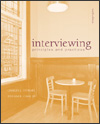 |  Interviewing: Principles and Practices, 10/e Charles J. Stewart,
Purdue University--West Lafayette
William B. Cash,
National Louis University--Evanston
The Probing Interview
Chapter Summary| The probing interview is the most common type of interview because it is used daily by persons ranging from journalists, police officers, and health care professionals to students, teachers, and parents. Length and formality vary, but the purpose and method are the same: to get needed information as accurately and completely as possible in the shortest amount of time. The means are careful questioning, listening, observing, and probing. Although preparation of an interview guide or schedule is important, the interviewer must remain flexible and adapt to each interviewee, situation, and response. This chapter has presented guidelines for structured probing interviews that call for thorough preparation and flexibility.
Interviewees need not be passive participants in probing interviews. When given advance notice, interviewees should prepare thoroughly. They should share control with the interviewer and not submit meekly to whatever is asked or demanded. And they should know the principles and strategies of effective answers. Good listening is essential. The result will be a better interview for both parties.
This chapter has presented guidelines for preparing and participating in probing interviews. The nature of each stage will depend upon the situation and the relationship between the interviewer and interviewee. |
|



 2003 McGraw-Hill Higher Education
2003 McGraw-Hill Higher Education